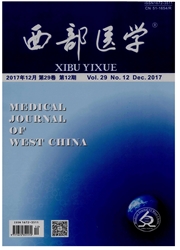

 中文摘要:
中文摘要:
目的观察富氢生理盐水对心肌梗死心肌重构的影响,并探讨其可能机制。方法选用20-25g的健康C57/BL6小鼠60只,随机分为对照组、心肌梗死(MI)组和MI+富氢生理盐水(HRS)组,21天后通过心脏超声、多导生理记录仪检测心脏功能和血流动力学指标,病理染色观察心肌梗死范围、心肌肥厚和间质纤维化,并检测梗死交界区心肌中氧化应激和炎症反应情况。结果腹腔注射HRS可以明显改善小鼠心肌梗死后心脏功能(P〈0.01或P〈0.05),缩小心肌梗死面积(P〈0.01),抑制非梗死区的心肌细胞肥大和间质纤维化,增强心肌中超氧化物岐化酶活性,降低丙二醛、肿瘤坏死因子-α、白细胞介素-1β、白细胞介素-6、单核细胞趋化蛋白-1含量(P〈0.01或P〈0.05)。结论 HRS通过抑制心肌重构来改善小鼠心肌梗死后的心脏功能,可能与其减轻氧化应激、抑制过度炎症反应有关。
 英文摘要:
英文摘要:
Objective To investigate the effect of hydrogen-rich saline(HRS)on cardiac remodeling after myocardial infarction and explore the underlying mechanisms.Methods Male C57/BL6 mice were randomly divided into control group,myocardial infarction(MI)group and MI plus HRS group(n= 20).After the intervention for 21 days,the haemodynamic data and cardiac function were measured by echocardiography and a physiological recorder.The infarct area,cardiac hypertrophy and myocardial interstitial fibrosis were evaluated by HE and Masson staining.In addition,the oxidative stress and inflammation in the peri-infarct region were also determined.Results Treatment of HRS via intraperitoneal injection improved cardiac diastolic function(P〈0.01,P〈0.05),reduced infarct area size(P〈0.01),inhibited cardiac hypertrophy and myocardial interstitial fibrosis after myocardial infarction.The treatment of HRS increased superoxide dismutase(SOD)activity,decreased malondialdehyde(MDA),tumor necrosis factor-α(TNF-α),interleukin 1β(IL-1β),interleukin 6(IL-6)and monocyte chemotactic protein 1(MCP-1)content in the peri-infarct region.Conclusion HRS may prevent cardiac remodeling and improve cardiac function via attenuating oxidative stress and inflammation.
 同期刊论文项目
同期刊论文项目
 同项目期刊论文
同项目期刊论文
 期刊信息
期刊信息
